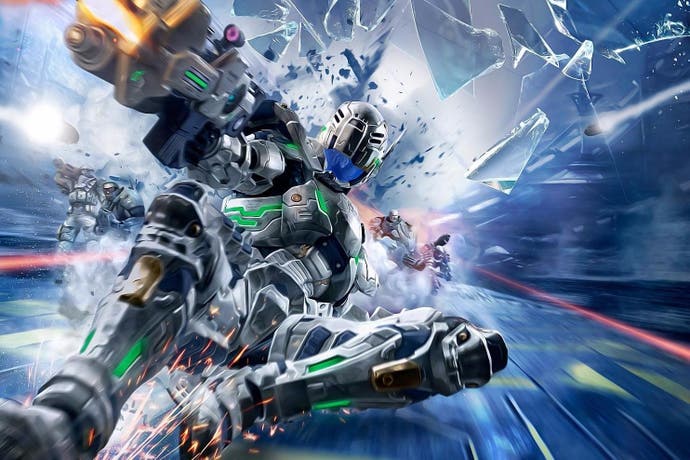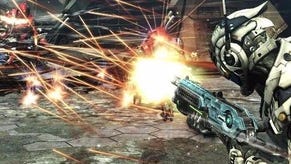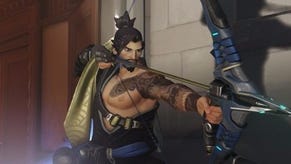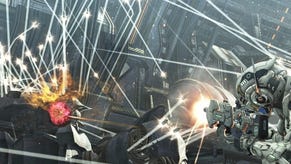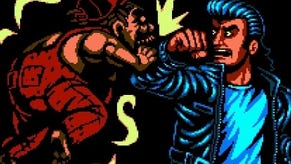Vanquish remains the pinnacle of cover shooters
Sliding into your DIMMs.
Sam Gideon cannot jump. There is surely no graver flaw in the video game multiverse, where the ability to leap is as valuable as one of the five senses, where even the lowliest grunt can manage a hop in a pinch. Still, the loss of one sense usually heightens another and what Vanquish's protagonist lacks in hang-time he amply makes up for in his ground game. Gideon glides across concrete like Michael Phelps skimming an Olympic pool. Sparks fly from those zinging metal knees as he streaks forward to donut a bewildered mecha. In Gideon's world, the term 'bullet time' is no mere poetic flourish. Squeeze an eye down the a gun's sights while sliding and time drawls to the extent that you can swat a fat, dangling rocket clean out of the air. Sam Gideon cannot jump. But by god he can fly.
Vanquish's director, Shinji Mikami, once attempted to articulate his game's euphoric appeal. "I think it's very rare to come across a game where shooting loads of robots is so much fun," he said, adorably, as if entirely surprised by how well things turned out. A friend of mine, the writer and game designer Jim Rossignol put it even more straightforwardly: "Vanquish plays like most action games pretend they play." Indeed, the game's first boss encounter with a quadrupedal tank plays out with the kind of directorial flair that's usually only possible in the tightly controlled context of a cutscene. Each time you knock out a mechanical limb, the monster responds with a hailstorm of nicking bullets. No cowering for Gideon, who weaves through the rain, a cigarette lolling from the lips. The fight climaxes with Gideon skipping between missiles, before he catches the last one, turns it, and plunges it back into the barrel from which it emerged. This kind of Michael Bay-esque overstatement is common in boisterous games. Rarely are we truly allowed to direct the action.
Gideon plays the role of star quarterback in a squadron of lumbering US marines. Geopolitically, Vanquish has dated poorly, even for a game set in the future. For one thing, the US president is a woman. Then, the game opens with the destruction of the Golden Gate bridge by invading Russian forces - an improbable scenario in this Trump era. You have eight hours to "stop New York from becoming the next San Francisco," as your commanding officer puts it. Gideon, a gruff-voiced yet nevertheless nerdish DARPA engineer, has been promoted to his position of significance not through athletic ability, but rather through his Augmented Reaction Suit, a bin liner's worth of armour that augments his abilities with amazing pizzazz. As well as facilitating those luxurious slides, the suit automatically triggers bullet time whenever Gideon takes too much damage, allowing him to slide off behind cover or, snipe the head off a red robotic soldier (no humans are killed by Gideon's hand in Vanquish).
This is a lean game, even for ruthless Mikami. The path through it is entirely linear, and there's no shop to plunder, or bonus items to nab (save for a spattering of tiny gold statues, hidden in the environment). Structurally, Vanquish shares territory with Call of Duty, then. What distinguishes and elevates Platinum's game, however, is the texture and finesse, the whip-tight control scheme that facilitates acrobatic, YouTube-friendly showboating and rewards mastery. Lob a grenade, for example, slow time and, with a well-aimed shot, you can blast it in the air with sharpshooter flair. Rescue a downed squad-mate and not only will they return to the fray to draw enemy fire, they'll also drop a weapon upgrade, encouraging you to look out for your comrades.
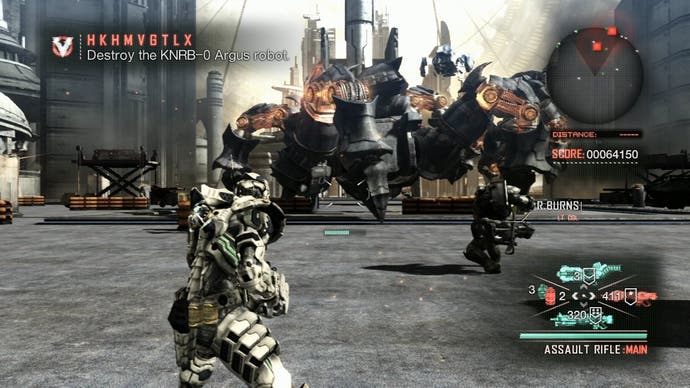
Each weapon in the game's small arsenal, from the slow rat-a-tat of the heavy machine gun to the head-popping kapow of the sniper rifle has its strategic place. By limiting you to carrying three at a time, you are constantly making choices that affect the optimal play style. The shotgun, for example, is useless at distance. At point blank range, however, it's as powerful as a rocket, encouraging you to stylishly slide into danger. That sliding move, besides looking cool, flips the familiar cover shooter's equation. Here you are rewarded from fleeing cover, rather than clinging to it.
Your special move gauge, which enables you to slide for longer, is yoked to your health, so evading fire has a deeper systemic relevance. Special moves empower you with added deadliness while simultaneously making you more vulnerable with reduced health. The game's systems are interconnected in a way that is rarely seen in action games (compare, say, the way that bullet time works without limitations in Max Payne, and the carefully considered restrictions placed on the same effect in Vanquish, and the way in which those restrictions drastically improve the dance). This unification gives every skirmish a rich, balletic texture.
None of this, regretfully, was enough at the time of Vanquish's launch. A cool reception greeted the game from those critics unable to look past the borderline insufferable braggadocio of its characters, the straining script and the game's hyperactive pacing. Vanquish sold fewer than a million copies. For those with eyes to see, however, this is a masterpiece, its arcade systems "ferociously precise, studied and peerless", as the game designer Adam Saltsman recently put it. A few years ago, one New York based designer told me that he spent an entire week watching slowed down YouTube videos of Gideon's sliding, flipping animations. The way in which art and game design interweaved was, he said, consummate. It's not perfect: the tutorials are inadequate and the lack of leaderboards in its astonishingly well-conceived Tactical Challenges a regretful oversight (which the PC version reportedly fixes). No matter. Vanquish remains the pinnacle of cover shooters, a game as lean and lithe as its hero, and one that pays extraordinary dividends on the smallest of investment.
